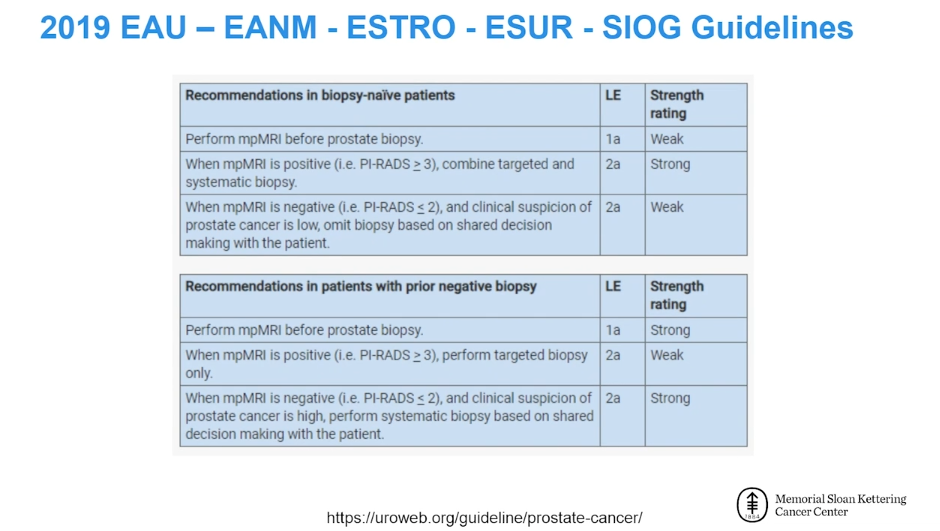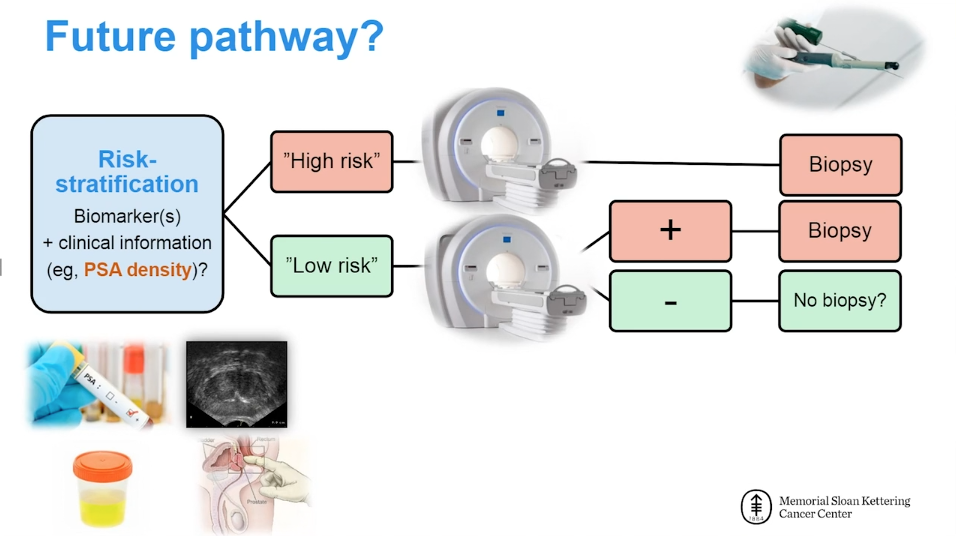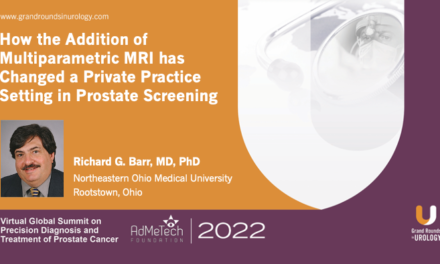Sigrid V. Carlsson, MD, PhD, MPH, and Gerald L. Andriole, Jr., MD, recount the arguments and conclusions from the “The Guidelines Controversies Session, Part Two,” held during the 34th Annual European Association of Urology Congress in Barcelona, Spain from March 15-19, 2019, in this video titled “Prostate Cancer – No Biopsy in Case of a Normal MRI.”
How to cite: Carlsson, Sigrid V. and Andriole, Gerald L. “Prostate Cancer – No Biopsy in Case of a Normal MRI” January 25, 2019. Accessed Jun 2025. https://grandroundsinurology.com/Prostate-Cancer-No-Biopsy-in-Case-of-a-Normal-MRI/
Prostate Cancer – No Biopsy in Case of a Normal MRI – Summary:
Sigrid V. Carlsson, MD, PhD, MPH, and Gerald L. Andriole, Jr., MD, discuss the pros and cons of omitting biopsy in patients with abnormal PSA levels and a negative MRI. While avoiding standard biopsy can mitigate serious complications, the data may not support full confidence in MRI’s detection quality.
Panel on Guidelines Controversies at the 34th Annual EAU Congress
Since 2017, there have been several large trials, namely PROMIS, Porpiglia, PRECISION, MRI-FIRST, and the 4M Trial, investigating the possibility of omitting biopsy in patients with abnormal PSA levels and a negative MRI. This evidence has informed changes seen in the 2019 European Association of Urology (EAU) Guidelines.
During a Guidelines Controversies session at the EAU’s 2019 annual meeting in Barcelona, Spain, independent experts explored the evidence base for these new recommendations. Nicolas Mottet, MD, PhD (Saint-Etienne, France) led the panel, while Professor Caroline M. Moore (London, Great Britain), Sigrid V. Carlsson, MD, PhD, MPH (New York, United States), and Olivier Rouvière, MD, PhD (Lyon, France) participated in a debate on the pros and cons of forgoing biopsy after MRI. Following the debate, the audience engaged in the discussion and voted on the matter. The vote was nearly 50% in favor of forgoing biopsy in these patients and 50% against it. This speaks to the fact that there is still much exploration and discussion needed to clarify the best course of action for patients in this situation.
The Role of MRI in Patients with Abnormal PSA Levels
Regardless of whether or not MRI can replace the need for a biopsy, there are many advantages to MRI itself when it shows a lesion. MRI-targeting enhances the ability to detect significant prostate cancer, reduce the overdiagnosis of insignificant disease, and more accurately characterize the size and Gleason score of the tumor than would be possible with random biopsy.
However, controversy still remains regarding what to do when an MRI does not show a significant lesion. According to the MRI-FIRST study, obtaining a multiparametric MRI before biopsy in biopsy-naive patients does not seem to supersede the need for systematic biopsy. Particularly for physicians working in the United States, failing to perform a biopsy when a patient is concerned about elevated PSA and delaying the ultimate diagnosis of cancer could result in serious liability consequences. Inter-observer variability also poses a limitation to MRI’s ability to accurately assess the presence of significant cancers, even among expert radiologists. Most importantly, the negative predictive value of MRI is not optimal, supporting the conclusion that a negative MRI cannot replace a biopsy.
A major argument for avoiding biopsy is that systematic transrectal ultrasound (TRUS) biopsy carries a burden of overdiagnosis, infectious complications, and hospitalizations.
ABOUT THE AUTHOR
Sigrid V. Carlsson, MD, PhD, MPH, is Director of Clinical Research at Memorial Sloan Kettering Cancer Center’s (MSKCC) Josie Robertson Surgery Center and Assistant Attending Epidemiologist, with dual appointments in MSKCC’s Departments of Surgery (Urology Service) and Epidemiology and Biostatistics. Her line of research focuses on screening and early detection of prostate cancer, including multiplex testing and risk-stratified strategies that incorporate clinical information, biomarkers and magnetic resonance imaging, as recently funded by an NIH/NCI U01 award (PI: Carlsson).
Dr. Carlsson also serves as Associate Professor of Experimental Urology affiliated with the Institute of Clinical Sciences, Sahlgrenska Academy, Gothenburg University, in Sweden, where she is an investigator of two large randomized controlled trials of prostate cancer screening (GOTEBORG-1&2), as recently published in the New England Journal of Medicine (Hugosson J, et al. N Engl J Med 2022). In addition, Dr. Carlsson is Adjunct Senior Lecturer in the Department of Translational Medicine in the Division of Urological Cancers in the Medical Faculty at Lund University, Lund, Sweden.
Dr. Carlsson recently completed a K22 career development award from the NIH/NCI to improve shared decision-making for breast and prostate cancer screening. She serves on the National Comprehensive Cancer Network (NCCN) and is a panel member for the American Urological Association (AUA) guidelines for early detection of prostate cancer. Before pursuing postdoctoral studies in urologic oncology at MSKCC, Dr. Carlsson was a physician in Sweden. She earned her MD and PhD from Gothenburg University in Sweden and earned an MPH from Harvard TH Chan School of Public Health in Boston, Massachusetts.






